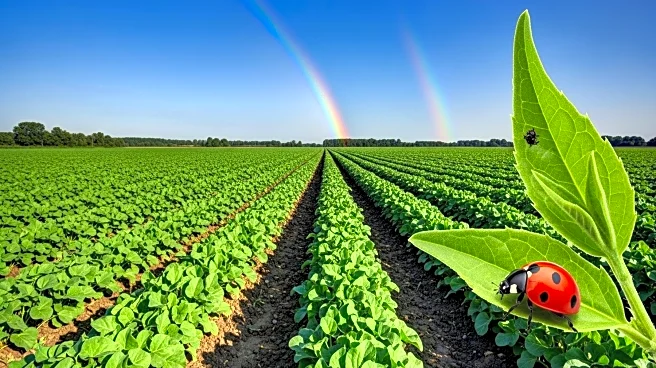What's Happening?
In Tourinha, Portugal, farmer Bruno Neves is adopting integrated pest management (IPM) to minimize the use of chemical pesticides on his farm. This approach involves creating favorable conditions for beneficial insects like ladybirds and hoverflies, which help control pests naturally. Neves is part of the EU-funded initiative IPMWORKS, which aims to reduce pesticide use while maintaining healthy crops. Despite IPM being mandatory in the EU since 2014, its adoption has been slow, with many farmers still relying heavily on pesticides. Neves, however, has successfully reduced his pesticide use significantly, spraying only three or four times last year compared to other farms that spray twice a week.
Why It's Important?
The shift towards IPM is crucial for reducing the environmental and health risks associated with chemical pesticides, which contaminate soil, water, and air, harm biodiversity, and pose health risks linked to chronic illnesses. By reducing pesticide reliance, IPM offers a cost-effective solution that benefits both farmers and the environment. The initiative has demonstrated that holistic IPM can be profitable, providing better pest control without loss of profits. Scaling up IPM could lead to a significant reduction in pesticide use across Europe, improving water quality, soil health, and biodiversity.
What's Next?
The success of IPMWORKS highlights the need for more financial incentives and a shift in perception to encourage wider adoption of IPM. Farmers need to see IPM as an economic opportunity rather than a constraint. The initiative has created farmer hubs for peer-to-peer learning and developed training modules and an online IPM Resource Toolbox to support sustainable farming practices. The challenge now is to scale up these successes to achieve a greener future for farming.
Beyond the Headlines
The adoption of IPM represents a broader shift in farming practices, emphasizing the importance of working with nature rather than against it. This approach not only reduces pesticide use but also fosters a mindset change among farmers, encouraging them to view environmental protection as integral to their role. The long-term vision is to create a sustainable farming model that benefits people, profits, and the planet.









